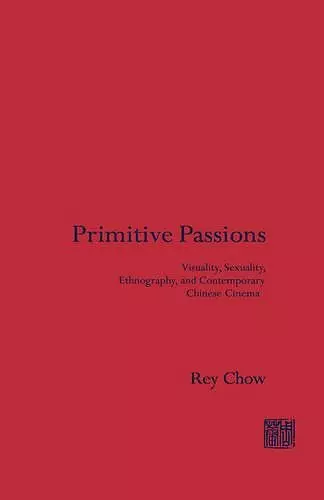Primitive Passions
Visuality, Sexuality, Ethnography, and Contemporary Chinese Cinema
Format:Hardback
Publisher:Columbia University Press
Published:30th Mar '95
Currently unavailable, and unfortunately no date known when it will be back

"Barry Shank's A Token of My Affection advances a complex and compelling argument linking economic structures to profoundly personal emotions. This is an original and insightful book." -- Elizabeth Dillon, Yale University "Theoretically astute, yet sensitive to the particularities and nuances of historical investigations, A Token of My Affection is an impressive and an important book. Rigorously refusing the still too common habit of treating the social history of private life as distinct from the public world of political and economic calculation, Barry Shank traces the intricate relations between them. In so doing, he ventures a sophisticated and consequential argument about the connections among the history of American capitalism, the greeting card industry and the generation of both private and collected affect through the course of the twentieth century." -- Janice Radway, Duke University " A Token of My Affection is a fascinating account of the history of the greeting card in America, taking us on a tour of the industry from its beginnings in the 1840s through corporate consolidation to the present. And more--it's an important exploration of just how our economic and emotional lives are connected. Barry Shank shows that there's no better way of examining what Raymond Williams called 'structures of feeling' than looking at valentines and Christmas cards. His book is full of interesting people, intriguing images, and big ideas." -- June Howard, professor of English, American Culture and Women's Studies, University of Michigan "Greeting cards might seem a banal subject: the mass production of sentiment has after all been a main activity of corporate media. Barry Shank's fine study explodes the banality, showing with insight and finesse how a changing business culture reshaped not just production, from the 1840s to the 1950s, but family, friendship, emotion, and much else. Valentine, Christmas, and later a host of specialized cards both carried and helped solidify new social relationships. The combination of sympathetic analysis and historical sweep in A Token of My Affection -- along with the sensuous imagery of hundreds of reproduced cards -- makes this book a model of cultural studies and a delight to read." -- Richard Ohmann, Wesleyan University
Situating modern Chinese film within the broader context of Chinese history and culture, this study argues that the cinema in China belongs to a firm tradition of visual arts that has for many years been suppressed. It analyzes the emotional response to social, political and economic deprivations.Each year in the United States, millions of mass-produced greeting cards proclaim their occasional messages: "For My Loving Daughter," "On the Occasion of Your Marriage," and "It's a Boy!" For more than 150 years, greeting cards have tapped into and organized a shared language of love, affection, and kinship, becoming an integral part of American life and culture. Contemporary incarnations of these emotional transactions performed through small bits of decorated paper are often dismissed as vacuous cliches employing worn-out stereotypes. Nevertheless, the relationship of greeting cards to systems of material production is well worth studying and understanding, for the modern greeting card is the product of an industry whose values and aims seem to contradict the sentiments that most cards express. In fact, greeting cards articulate shifting forms of love and affiliation experienced by people whose lives have been shaped by the major economic changes of the late nineteenth and twentieth centuries. A Token of My Affection shows in fascinating detail how the evolution of the greeting card reveals the fundamental power of economic organization to enable and constrain experiences of longing, status, desire, social connectedness, and love and to structure and partially determine the most private, internal, and intimate of feelings.Beautifully illustrated, A Token of My Affection follows the development of the modern greeting card industry from the 1840s, as a way of recovering that most elusive of things -- the emotional subjectivity of another age. Barry Shank charts the evolution of the greeting card from an afterthought to a traditional printing and stationery business in the mid-nineteenth century to a multibillion-dollar industry a hundred years later. He explains what an industry devoted to emotional sincerity means for the lives of all Americans. Blending archival research in business history with a study of surviving artifacts and a literary analysis of a broad range of relevant texts and primary sources, Shank demonstrates the power of business to affect love and the ability of love to find its way in the marketplace of consumer society.
"This volume will be a useful addition to marketing and social sciences collections... Recommended" -- Choice "An intellectually rich, deeply researched history of mass-produced consumer good whose success depends on its ability to connect people emotionally." -- David Farber, Enterprise & Society "A carefully detailed history... An interesting read." -- Antiques & The Arts Weekly "This well-written and nicely illustrated book illuminates how the imagery in greeting cards has reflected overt and covert classist assumptions." -- Cele C. Otnes "A carefully detailed history." -- Antiques and the Arts Weekly " A Token of My Affection is an important work of American studies and contributes much to business history." -- Catherine Gudis, American Studies "A beautifully illustrated, painstakingly researched book... [a] smart, ambitious, innovative study." -- Lori Merish, American Historial Review
ISBN: 9780231076821
Dimensions: unknown
Weight: unknown
268 pages